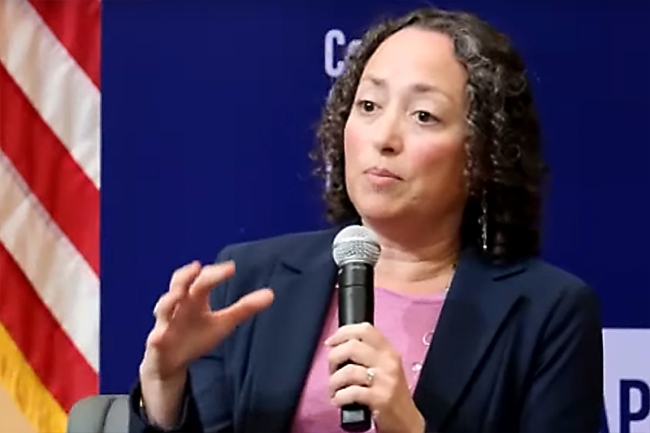You have /5 articles left.
Sign up for a free account or log in.

The Center for American Progress, a liberal think tank, hosted a wide-ranging discussion with Catherine Lhamon, assistant secretary in the Education Department’s Office for Civil Rights, during an event Aug. 29, 2023.
Katherine Knott/Inside Higher Ed
Despite the Supreme Court’s decision earlier this summer striking down race-conscious admissions policies, American colleges and universities can still recruit and retain diverse classes—if they’re willing, a top Education Department official said Tuesday.
“There are a lot of ways to admit, support and graduate students that are separate and apart from the admissions practice that was in front of the court,” Catherine Lhamon, assistant secretary in the Education Department’s Office for Civil Rights, said during a talk at the Center for American Progress, a liberal think tank. “We have not been told that it’s unlawful to engage in other practices.”
Lhamon’s Office for Civil Rights released guidance documents earlier this month on how colleges and universities can recruit diverse classes and comply with the court’s ruling. Further guidance is expected next month. Lhamon said that colleges and universities can take into account how an applicant’s race has affected their individual experience and work to make sure that students feel welcome and included on campuses. The decision also doesn’t bar institutions from collecting student demographic data, she said, although the data related to the race of applicants can’t influence admissions decisions.
The options still open to colleges “offer up a very wide-open field for the coalition of the willing,” Lhamon said, “and I hope that coalition is wide.”
Last week, the Office for Civil Rights released guidance explaining that school-sponsored student groups or programs that focus on race would not violate federal law as long as they are open to all students. Lhamon said she considered that document a companion to the affirmative action guidance. Some conservative legal activists have argued that the Supreme Court’s decision would make such groups or programs illegal.
“There’s so much public conversation now about whether [diversity, equity and inclusion] activities are lawful and whether they’re even good policy goals,” she said. “I really want school communities to hear from me an emphatic yes. Federal law does not categorically bar those kinds of activities, and there are circumstances under which it’s actually required.”
Since the court’s decision came down, a number of state officials and outside groups, including Students for Fair Admission, which brought the lawsuits challenging race-conscious admissions, have weighed in on what the opinion meant and what colleges are no longer able to do. The Missouri attorney general immediately told state universities to drop scholarships for minority students.
The Office for Civil Rights has said the decision doesn’t apply to financial aid or scholarships.
“I have been disturbed by the degree to which I see a deliberate overread of the recent court decisions,” Lhamon said.
Lhamon, who is on her second stint as head of the Office for Civil Rights, said the court’s decision does mean “a new day” for the office and a “sea change” for the country. The office already has received complaints challenging university admissions practices and opened an investigation into legacy admissions at Harvard University.
“It’s an opportunity—welcome or not—to reconsider what and how to do the work to admit, retain, support and graduate diverse classes,” she said, “and nothing in the court’s decision challenges the ability to engage in those practices.”
This new day for the office comes as the agency continues to see more complaints from students and families alleging discrimination in either K-12 or higher education. The office received 18,804 complaints—a record—during the last fiscal year, from Oct. 1, 2021, to Sept. 30, 2022. The previous record was set in fiscal year 2016, when the agency received more than 16,700 complaints.
Lhamon said that while an increase in complaints is not good news, she’s “pleased that people feel the government will be there for them.”
“On the other hand, the volume, complexity and range of kinds of harms that we see in this time, certainly the allegations in the complaints, are astonishing,” she said. “It’s hard and painful to see.”
At the same time, the office has fewer staff members to handle and investigate the complaints than it did in 2016. The Biden administration has asked Congress to kick in $178 million more for the office, in part to boost staffing, though that funding increase appears unlikely to materialize.
“It’s a hard time to be doing the work,” she said.
During the question-and-answer portion of the event, a representative from the American Federation of Teachers said the union was hearing from faculty members involved in graduate school admissions who have been told to not ask about or consider race. That’s an overreach, Lhamon said. The court did not tell admissions officers to ignore an applicant’s race.
“As huge as the decision is in terms of changing practices at schools, there’s also an even huger universe that it didn’t touch,” said Lhamon, who noted that only about 200 institutions were considering a student’s race as part of the admissions process prior to the Supreme Court decision. “I think we should be focused on what’s available.”




